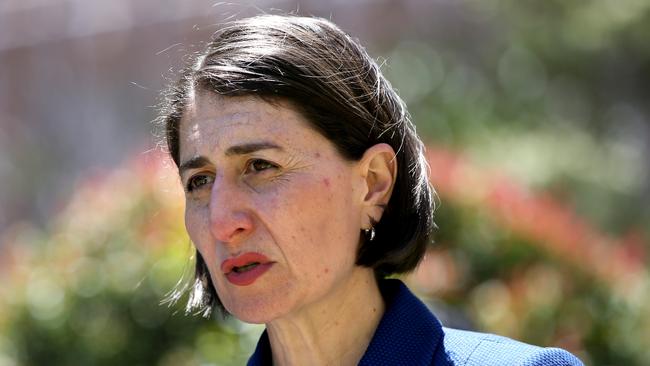Gladys Berejiklian raises her voice on anthem change
The national anthem’s description of Australia as a young country should be removed, Indigenous leaders and politicians say.

The national anthem’s description of Australia as a young country is untrue and should be removed from the second line of the song, Indigenous leaders and politicians said on Wednesday.
But the suggestion by NSW Premier Gladys Berejiklian on the eve of the second State of Origin game was designed to acknowledge that Aboriginal and Torres Strait Islander people occupied Australia for tens of thousands of years before British settlement, was also described as a distraction from the serious matter of unfinished business between Indigenous and non-Indigenous Australians.
While the Morrison government has no plans to change the anthem, Indigenous Australians Minister Ken Wyatt and Labor Indigenous Australians spokeswoman Linda Burney each back Ms Berejiklian’s announcement that she wants the words “we are young and free” changed to “we are one and free”.
Labor senator Pat Dodson told The Australian he thought it was significant that a politician of Ms Berejiklian’s status would want to make such a change, but “a treaty with First Nations of NSW would be even more welcome”.
“It’s a bit of a refreshing interlude in the context of far more important things to be sorted,” Senator Dodson said.
West Australian Aboriginal Affairs Minister Ben Wyatt, an Indigenous man and nephew Ken Wyatt, said the anthem had been divisive and Ms Berejiklian’s proposal “highlights the fact that the commonwealth certainly does need to think about how they can make our national song more inclusive”.
Victorian Premier Daniel Andrews, whose Labor government has begun a treaty process with the state’s Indigenous people, said: “Symbols are important, but action is what matters most.”
Sally Scales, chair of the executive council of the Anangu Pitjantjatjara Yankunytjatjara lands in South Australia’s northwest, said the suggestion seemed like an attempt at a quick fix as well as a distraction from the need for substantive change.
Ms Scales believes it would also be incorrect to change the national anthem to announce that Australians are unified as one people when there was so much unfinished business between Indigenous and non-Indigenous Australians.
“Why would we change it to ‘one’ when our country is not even one yet?” she said. “It is very much how a lot of people deal with Indigenous affairs — a quick Band-Aid ‘here you go’ instead of getting to the substance of the issues.”
Ms Scales is among signatories to the 2017 Uluru Statement from the Heart who believe a constitutionally enshrined Indigenous voice would bring about structural change that Australia needs.
Currently, the Morrison government is preparing to legislate an Indigenous voice rather than enshrine it in the Constitution.
“The big thing I noticed in Australia’s response to the pandemic is how quickly government can act and they are not willing to do that when it comes to Aboriginal issues,” she said.
“A constitutionally enshrined voice would strengthen treaty negotiations but instead we get all this political will used on such an insignificant thing — one word in a song.”
Indigenous leader Warren Mundine, formerly head of the Abbott government’s Indigenous Advisory Council, said he was initially hesitant about Ms Berejiklian’s idea but decided he liked it because it was a change that promoted unity and “it is not playing up to the more extreme element”.




To join the conversation, please log in. Don't have an account? Register
Join the conversation, you are commenting as Logout